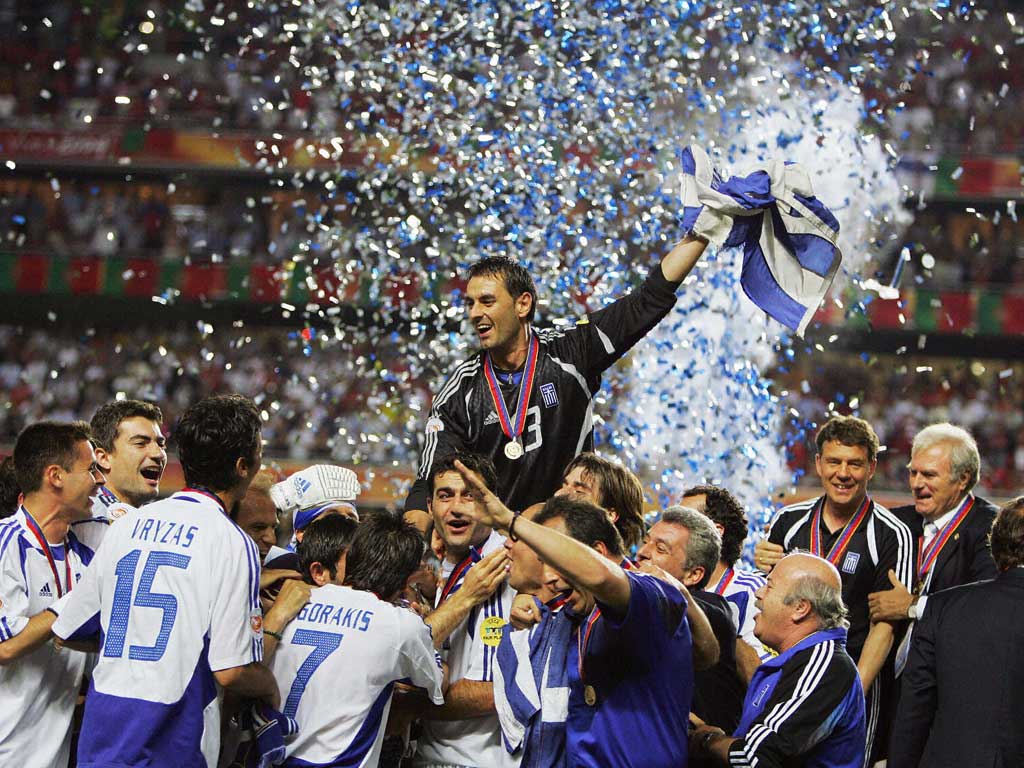Poor Greece look a spent force
Eight years ago they produced a stunning success but there looks to be little hope of a repeat

Heard the one about the Greeks, the German and the Euro? Strange as it seems given the economic crisis gripping Greece, there was a time not so long ago when Euro was less a dirty word for many of its citizens than a cause for national celebration.
It was in summer 2004 that a Greece team led by a German coach, Otto Rehhagel, became the improbable continental champions thanks to a 1-0 victory over Portugal in the European Championship final in Lisbon. "A football miracle that will be very difficult to repeat" is how Stelios Giannakopoulos, the former Bolton Wanderers midfielder, remembers it.
"We didn't go there to win the tournament but game after game we saw that anything is possible. Rehhagel played a big part. He came into a Greek group of players and put German discipline together with the Greek talent – it was a very good combination," adds Stelios, offering an unwitting slogan for Angela Merkel.
Greece had not won a single game at a major tournament prior to Euro 2004 but a 2-1 victory over Portugal in the opening match set them on a fairytale run that included the quarter-final dethroning of France. As their captain and one-time Leicester City midfielder Theodoros Zagorakis puts it: "We began thinking we could do something big."
So it proved but as their successors prepare to face co-hosts Poland in another Euro curtain-raiser in Warsaw on Friday, the achievement of Rehhagel's team feels like a distant dream. On the pitch, Greece topped their qualifying group ahead of Croatia but have won only one of five warm-up matches since –1-0 in Armenia on Thursday – which hardly augurs well, despite their presence in the competition's weakest section. Yet it is off the pitch that Greek football – mirroring the society around it – faces its biggest challenge, whatever welcome distractions Euro 2012 might provide.
"The financial problem is very big and has influenced football," says Stelios, now president of the Greek PFA. "Even some big clubs in Greece have massive problems." If the most successful side, Olympiakos, benefit from their annual Champions' League income, the two other major Athens teams, Panathinaikos and AEK, each have estimated debts of at least €50m, with the latter among several clubs so far denied a licence to compete in next season's Super League.
Zagorakis himself had to step down as president of PAOK Salonika in January after fans reacted angrily to his decision to sell the club's star player, Vieirinha, to help balance the books. He believes Greek clubs must act now to "minimise their debts" and sees PAOK's own focus on youth players as the only way forward.
If Greece is the sick man of Europe, two news stories from the past 12 months highlight the ill health of its football. Last June a bribery scandal broke after Uefa officials handed the Greek authorities a report into irregular betting patterns, mostly involving second-division and cup fixtures. There were 70 arrests, including Vangelis Marinakis – the shipping magnate and Olympiakos chairman– as well as the Olympiakos and Greece defender Avraam Papadopoulos.
Marinakis, who stepped down as the Super League president last summer, was charged with complicity to commit acts of bribery and match manipulation but in the end the only parties punished were Olympiakos Volou and Kavala, two top-flight clubs demoted three divisions – and their jailed owners.
A survey published this year by FIFPro, the world players' union, into football in 12 countries in eastern Europe added grist to the rumour mill: it found 30 per cent of players in Greece had been approached to consider fixing the result of a match, while 47 per cent said they were aware of fixed matches. Moreover, of the 505 players polled, 67.5 per cent do not receive their salaries on time – with some waiting for up to a year.
Those in the national squad are the lucky ones, however. "I do not believethat the Greece players are affected by the economic situation," says Zagorakis. Stelios concurs: "Some play abroad and those in Greek clubs mainly don't have any issues because sooner or later they will get paid."
There is no problem for their Portuguese coach, Fernando Santos, either, who recently received a much-reported salary rise to €600,000 annually. That said, in the run-up to Euro 2012, the Greece players have voiced their desire to give the public at home some much-needed cheer – Georgios Karagounis, one of the survivors of 2004, spoke of helping them "forget for a short time, at least, the problems of everyday life".
Stelios believes this could provide an extra spur and hopes history might repeat itself for Greece – on Friday at least. "The first game will be a key game because we play the hosts and [as when] we played Portugal in the opening game at Euro 2004, the Polish are going to have big pressure because the whole nation is going to expect them to win. They will be nervous, they will be under pressure and we have to take advantage of that."
If not, the final group game against Russia on 16 June could lead to some unwanted headlines the next morning. Just imagine, "Greece exit Euro" on the very day the country's voters go back to the polls.
Join our commenting forum
Join thought-provoking conversations, follow other Independent readers and see their replies
Comments
Bookmark popover
Removed from bookmarks